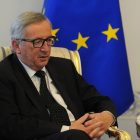
Poland, Hungary, Slovakia and the Czech Republic have joined forces in an effort to spur a less centralized Europe. The move comes weeks after the United Kingdom voted to leave the European Union. The vote caused a ripple across markets worldwide as the world awaits Britain’s path moving forward.
Slovakia is taking the current presidency of the European Union seriously. The country has paid for massive upgrades to the tune of €14m to add new benches, rubbish bins and fill potholes in Bratislava. The country has also lined green spaces with mobile toilets, and free wireless access has been installed, too.
The move is a direct response to the country’s rotating role. The agenda for the country has come to a stop following Brexit. “No one saw it coming,” states one analyst from Poland.
Robert Fico, the Prime Minister of Slovakia, has the difficult task of representing his country of 5.5 million people at a time when the economic atmosphere has changed drastically. “Brexit is the number one order,” according to the country’s foreign minister.
Fears among Poland, Hungary, Slovakia and the Czech Republic (V4) is that Germany will move hastily to speed up European Union integration. The countries are afraid their voices will be marginalized as a result.
The coming months following Britain’s exit from the EU could also allow these members to play a more integral part in the EU’s decision making. It’s a chance for smaller members of the EU to have their voices heard. The concerns of all four countries’ citizens need to be heard and reflected in the new EU following Brexit.
The UK was the voice of all of the countries before Brexit. Partners with all four countries, London held a common viewpoint on European problems, according to Polish foreign minister Witold Waszczykowksi. Estimates also put 1.2 million citizens of all four countries in the UK. These citizens face uncertainty following Brexit.

Labour markets in the United Kingdom were immediately opened following the formation of the EU, which allowed workers from all across the EU to work in London. Germany and France offered a transitional period to allow workers to enter their respective labour markets.
V4 leaders are further concerned that the views of Germany and France on integration will be at the forefront of the agenda moving forward.
Britain’s view was to expand the European Union rather than furthering integration. The V4 also lost a partner that held the same views on Russia and the need to sanction the country as necessary.
Issues following Brexit immediately showed concern for the V4, as Germany invited only the first six founding members of the EU to Berlin. The founding members were invited by Frank-Walter Steinmeier, German foreign minister, to pledge support for a stronger, closer EU.
Poland, Hungary and the Czech Republic are three countries that have not adopted the euro. Concerns from these countries over adopting the euro are evermore important as the countries’ citizens have low incomes. The meeting with the original six founding members ended when French prime minister Jean-Marc Ayrault petitioned for a political union that centered around the euro.

